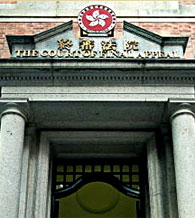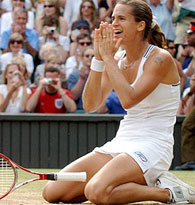Hong Kong awaits age of consent ruling
The Hong Kong Appeals Court last Thursday and Friday heard debates on the age at which both homosexuals and heterosexuals can have sex in the government's appeal against a landmark ruling in a case that sought to lower the city's age of consent for gays from 21.

Hong Kong only decriminalised homosexuality in 1991.
The case was brought about by 21-year-old William Leung who thought that the current laws are unfair.
Senior counsel for the government Gerard McCoy had sought to convince justices Geoffrey Ma Tao-li, Robert Tang Ching and Woo Kwok-hing that Leung's case was flawed because it was not challenged under the Crimes Ordinance and that it was a "hypothetical" issue that did not relate to any previous legal decision.
"You can't get in the door at all except as the law comes to you. The law has not stepped towards him. He stepped towards the law. You cannot walk in off the street and plunk down HK$1,150 (US$150) and say: 'I want to change a law that has been around for years.'" McCoy said.
Ma asked: "Why should a bad law be perpetuated? Especially if others have already been convicted of it? If a law is bad the sooner it is dealt with, the better to be rid of it."
Although McCoy agreed with Ma that "homosexual behavior is not deviant or unnatural," he denied that the law was discriminatory.
In an argument that centered around anal sex as a form of sexual affection, McCoy asserted that Hartmann's decision created "inequality" as legalising anal sex for gay men 16 and above would in fact discriminate against "all heterosexuals who commit buggery with females" under 21 as anal sex is considered illegal for males and females under 21.
When asked if anal sex and penile-vaginal sex were equivalent, McCoy said they were not because intercourse is "procreative."
Ma then asked, "Is that the only purpose of sexual intercourse?"
"Of course not," McCoy responded.
Ma said, "So buggery is a form of affection between loving homosexuals just as sexual intercourse is for heterosexuals."
Woo added, "the only thing which can't be criminalised is a male under 21 committing buggery (having anal sex) with a female over 21. That would not be a crime."
McCoy was repeatedly asked by Tang to define the "moral issue" concerning buggery and age of consent laws.
He said, "I can only assert that the moral issue must be that it takes two to tango and that males mature more slowly than females and that the legislature decided that the youth of Hong Kong must be protected from itself."
Gay groups have criticised the government's appeal against the original ruling. It is not known when the Appeals Court will announce their decision.
Lesbian tennis star wins Wimbledon
French lesbian tennis player Amélie Mauresmo won the Wimbledon title last Saturday beating Belgium's Justine Henin-Hardenne 2-6 6-3 6-4 for her second grand slam title, having won the Australian Open in January. The win, a first by a Frenchwoman in 81 years, has consolidated the 27-year-old on top of the Women's Tennis Association (WTA) rankings.

Mauresmo, currently ranked No. 1, came out at the Australian Open in January 1999 at age 19.
Mauresmo came out at the Australian Open in January 1999 at age 19 and was infamously called "half a man" by fellow tennis player and opponent Martina Hingis, then 18, while speaking to reporters before the final. Ironically, Hingis was named after Martina Navrátilová, a lesbian and outspoken gay rights advocate who is considered to be one of the greatest tennis players of all time and possibly the most famous lesbian in the sporting world today with 18 Grand Slam singles titles (including nine Wimbledon titles) and 40 Grand Slam doubles titles.
Reflecting on the incident after winning the Australian Open in January, Maursemo said, "That final and those days seven years ago were a bit painful," reported the New York Times.
On her win this time, Mauresmo said: "It feels great. I had a great two weeks. I really wanted to win this trophy. It's a great moment for me. This trophy is so special in the world of tennis. I am very proud."
Tokyo gay film festival marks 15th year
The 15th Tokyo International Lesbian and Gay Film Festival, set to run July 7-8 and 13-17, will show 14 feature-length films and 21 shorts from around the world.

The Masseur (Masahista) by first-time director Brillante Mendoza is a well-received Filipino film about a gay for pay rent boy.
Other features include the Indian film Sancharam (The Journey), directed by Ligy J. Pullappally which has widely toured film festivals worldwide and won three awards in India despite its controversial theme and The Masseur (Masahista) by first-time director Brillante Mendoza is a well-received Filipino film about a gay for pay rent boy.
The German feature Sommersturm (Summer Storm), by writer-director Marco Kreuzpaintner, is a coming of age tale involving gay (and straight) teenagers at a rowing camp.
Films in this festival are from Japan, Argentina, Australia, Hong Kong, the Philippines, Russia, South Korea, Spain and Switzerland.
Tickets for each screening are 1,300 yen in advance or 1,500 yen at the door. Except for the Japanese film "g8-2 (kari)," movies not in English will have English subtitles. For details, fax (020) 4666-6983 or visit www.tokyo-lgff.org.
